Police Story 3: Supercop (1992)
Directed by: Stanley Tong
Written by: Fibe Ma, Lee Wai Yee
Starring: Jackie Chan, Kenneth Tsang, Michelle Yeoh, Yuen Wah
AKA GING CHAAT GOO SI III; CHIU KUP GING CHAAT
HONG KONG
AVAILABLE ON BLU-RAY on its own and in the “POLICE STORY” SERIES set: 26TH SEPTEMBER, from EUREKA ENTERTAINMENT
RUNNING TIME: 97 mins/ 91 mins [“Supercop” Version]
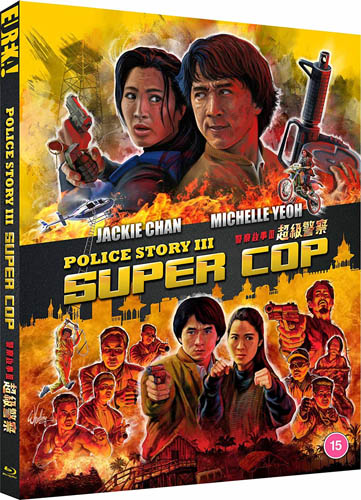
Drug smuggling is causing a lot of fatalities and the Chinese authorities want to do something about it. The answer is Hong Kong’s Inspector Chan Ka-Kui, now considered a ‘Supercop’ by his superiors, so he’s sent to China where the military police force’s Interpol director, Jessica Yang, tells him that the target of the mission is a drug lord named Chaibat. In order to infiltrate Chaibat’s Triad organization, Ka-Kui has to get close to Chaibat’s henchman Panther, who’s being held in a Chinese prison labour camp in Canton. Ka-Kui, posing as a petty criminal, helps Panther escape with the aid of military police, and Panther takes him under his wing, though he’s soon stuck with Jessica too when she pretends to shoot dead a policeman. The two cops have to avoid being found out and discover what Chaibat’s big plan is….
So at last Eureka Entertainment give us Police Story 3: Supercop, three years after their sterling Blu-ray releases of Police Story and Police Story 2. While Jackie Chan’s second outing as Hong Kong’s cop hero was, despite a few differences, pretty similar to his first and working very well as a straight continuation of it, this third one is really rathet different. It takes Ka-Kui out of his Hong Kong stomping ground and puts him in some different locations, thereby giving the film more of an ‘international’ feel. Chan had already done this in some other films, but this one is more ‘western’ in approach, something that would continue in Chan’s films for a while when he finally had the American market interested in him. Of course there are still fighting and comedy scenes, but the former are less elaborate and the latter more integrated into the plot. Atoning for this, there’s more diversity of action and even more of an emphasis on big stunt sequences where, unlike in Hollywood actioners, the stars really are doing it for real, plus a much more evenly paced narrative where the stakes seem to be increasingly raised in a film which gets bigger as it goes along and gives us an incredible final act of several thrill sequences joined together, the filmmakers relishing the freedom of shooting in Malaysia which, in direct contrast to Hong Kong, was clearly happy to let Chan and co. do what they wanted. The Ka-Kui character is disappointingly toned down, but for once Chan is given a partner who’s allowed to match him, in the shape of the incredible Michelle Yeoh. I like it slightly less than the previous two, but one can make a good case for it being a better film. It’s certainly a more even and balanced one.
Chan had gone way over budget and over time filming Miracles: The Canton Godfather and Operation Condor: Armour Of God 2, so Golden Harvest suggested that he let somebody direct for a change. Stanley Tong had only made one previous film, Stone Age Warriors, but was given a surprising amount of creative control by Chan and Golden Harvest over the project. He rewrote much of Edward Tang’s script, which was originally set in Hong Kong and had Ka-Kui on his own for much of the time as he thwarted some jewel thieves. He also brought back Hong Kong’s top female action star of films like Yes Madam and Magnificent Warriors, who’d stopped making films when she got married four years before, but was now divorced. She’d actually appeared in a Chan film before, Twinkle Twinkle Lucky Stars, though they did not meet on-screen. This time there were two stars putting their life on the line. Chan got seriously hurt when he was knocked unconscious by a helicopter while hanging on to a train, while Yeoh fell from a lorry onto a car and then onto the road because the windscreen failed to shatter. Oh, and Tong would sometimes do stunts himself in his films, and joined in here by being the person who crashes the helicopter onto a tunnel; he broke his shin for this troubles. To complete filming on time, a fight sequence between Yeoh and Kim Penn was left un-shot, as was some rooftop brawling. Filmed in Hong Kong, Mainland China and Malaysia, it was the first Hong Kong film to be shot in synch sound; up to then they’d been shot silent because they were always dubbed into various languages including the two main types of Chinese Mandarin and Cantonese. It won Chan the Best Actor Award in Hong Kong, a first for an action star, though it wasn’t quite the smash expected. Four years later, it was released theatrically in the US as Supercop after Chan’s success there with Rumble In The Bronx, in an altered version.
“What we want is a Supercop” says one of the British superiors in a rather awkward opening scene after another has explained how awful drug smuggling is, leading to a nice continued gag of superiors giving jobs to underlings so they don’t have to do them themselves. Said Supercop then listens at the door to Uncle Bill and his immediate superior discussing him. Ka-Kui’s still with his long-suffering girlfriend May, but now has to leave her though, after a moment when Ka-Kui avoids her moves to kiss him to get a key and he gives her life insurance, they actually kiss this time on a bed and it looks like they then have sex. Then Ka-Kui is on his way, and this third instalment takes its time to get to the action as he prepares for his mission, though I like the way it starts slow and just escalates. The first fight is more of a demonstration rather than a battle between Ka-Kui and a villain, as he has a bout with a guy in front of loads of others whilst training for his mission, and yes, one wonders why Ka-Kui would need to train at all considering what he was like in the first two films. He can’t even twirl a spear properly. Ka-Kui gets in with the criminal gang though mustn’t blow his cover; fortunately, not just Jessica but others are around to help sometimes. The plot goes off the rails just slightly when we rather randomly switch to the Red Triangle, a load of gangster bosses played by familiar screen villains and lots of military, plus a rehash of the baseball scene in The Untouchables with a durian, but gets back on track when we’re in Kuala Lumpur where Chaibat’s wife, Chen Wen-Shi, is in prison, facing the death penalty for an unspecified crime. Chaibat needs to get her out of prison, because only she knows the secret codes to his Swiss bank account, and will not reveal them to him unless freed. Chaibat brings his gang, including Ka-Kui and Yang, to Kuala Lumpur to stage a jailbreak – and it’s here where things really take off.
The escape sequence has, after a tiny fight, Ka-Kui and Panther hang on a cable car between two mountains; its’s sped up but this was probably necessary. There are quite a few brief bursts of martial arts to follow, one where Jessica actually rescues Chan and does more cool moves than him including an incredible leap to kick two people in the face; there are cuts and probably use of a wire but the kick is still awesome, as is when Ka-Kui is helping Panther fight off cops but is also stopping him from stabbing them with a broken bottle. The brevity of these fights seems like a deliberate choice, partly to make the film appeal more to westerners, who weren’t supposed to like long fights. A boat chase and then some gunplay and some spectacular pyrotechnics in the Red Triangle section follow before we relocate and build to a mostly incredible series of death-defying action scenes. Chan jumps from the back of a lorry to a car just avoiding crates falling out of the lorry, jumps onto a ladder connected to a helicopter [only some empty crates and plastic sheets were one hundred feet below to break the fall], hangs onto the ladder while being flown around the city, then battles two bad guys atop a train [including Ken Lo again]. Meanwhile Yeoh is kicked down a rooftop, hangs onto the side of a van, falls off it to smash against the windshield of the car behind, then drives a bike onto a train. Neither Chan nor Tong wanted her to do the bike stunt because a stuntman broke his leg doing it, but she did the majority of it anyway with a stunt person filling in for a few shots, and can be seen to careen off the train in the out-takes. This whole twenty minutes is action cinema taken to awe-inspiring heights; exhilarating, thrilling and foolhardy as hell. We can forgive the fact that we don’t get much of a fight between Chan and Yuen Wah as Panther.
While we still get gags like Chan on a large wheel spinning out of control, the comedy is generally less slapstick orientated and Chan therefore does no real mugging. The funniest sequence is when Ka-Kui is asked by Panther to take him and a couple of others to his home; a young child and even old Uncle Bill as his mother are among those who pretend to be members of his family. May is brought in just before the climactic action scenes, and we get to hear Cheung speak some English too. May has a job as a tour guide who just happens to be working in Kuala Lumpur while Ka-Kui and Panther are scouting out the area. May sees Ka-Kui in a just-taken photograph with Yang and of course thinks that he’s cheating on her. Ka-Kui doesn’t want to blow his cover and unsuccessfully tries to hide, while Panther thinks she’s a prostitute. It’s all very well worked out until, in a rehash of part of Police Story 2, May gets kidnapped again and Ka-Kui is forced to work for the bad guys. It’s disappointing how the relationship between Ka-Kui and May, dealt with so well in the previous film, is just used as a basis for laughs, but then Ka-Kui isn’t really the same character here which does make him rather less interesting. Before, he was a simple cop who goes into an almost animalistic rage when faced with danger and whose life just gets worse and worse. Here, he’s just a ‘Supercop’ who stays fairly calm despite what’s going on, a character who may as well be called Jackie just like in some of his roles to follow where he really is the same in each film. Benny Lo and Mars turn up to play different roles to their ones in the first two film.
Unlike Chan, who tended to make things up as he went along, Tong storyboarded most of the action in the film, though his directorial style is not that different from Chan’s except for more wide-angle shots and some unusual angles. The editing by Peter Cheung and Ka-Fai Cheung is truly excellent in terms of concealing the many stunt people used. This film suffers from a rather poor, mostly synthesiser score from Man Chew, Jenny Chinn and Jonathan Lee which rarely seems to make much of an effort to enhance what is happening on-screen. A comedic piece used several times is very cumbersome. The Chan-sung song at the end is very poor too, at least in terms of its tune; these translated lyrics, usually about heroism, rarely come off well for us non-Chinese speaking types. Even though I’ve pointed out several flaws with Police Story 3, it’s still a tremendously fun picture and its mixture of action, comedy and plot is very well balanced, with none of the tonal inconsistencies we saw in the first two films; this doesn’t automatically make it a better film for some but it’s definitely a smoother one. And it truly soars when Chan and Yeoh are on-screen together, be it barbed banter where she usually gives as good as she gets, battling to see who can do the more foolhardy stunt, or Yeoh shooting a load of bad guys as she falls forward onto Chan [even though her character is supposed to have explosives on her bullet proof vest], whose hands end up supporting where her breasts are before she falls right on him, though their relationship is more brotherly/sisterly in nature. It’s ust perfectly pitched. They’re one of the greatest partnerships in action cinema, and it’s a great shame they never did it all over again, though Yeoh’s character did return the next year in Tong’s Project S, in which Chan, playing Ka-Kui, made a brief appearance.
Eureka’s versions of Police Story 1 and 2 received criticism from some movie buyers, though the issues I saw seemed minor. Yes, the films looked a bit different from the way they did in earlier releases, but who’s to say which is closer to their cinema presentation? Anyway, I can’t see many finding issues with Police Story 3, which has a nice and diverse colour balance throughout; I haven’t yet mentioned the wonderfully neo-noir look to a scene early on which only really comes out in this version. Grain balance is very even and blacks are deep. There’s a frame jump at the lower portion of the screen about half way through, but it’s an isolated flaw in a quality restoration.
SPECIAL FEATURES
Limited Edition slipcase featuring new artwork by Darren Wheeling [3000 copies]
Reversible sleeve artwork featuring new and original poster artwork
1080p HD presentation on Blu-ray of the original Hong Kong theatrical cut [96 mins] from a brand new 4K restoration of the original film elements
Limited Edition set of facsimile lobby cards [3000 copies]
1080p HD presentation of the alternate US version [91 mins]
Hong Kong Theatrical Version – Original Cantonese mono audio, as well as an optional alternate Cantonese audio track featuring original, unaltered, sound effects
Hong Kong Theatrical Version – Brand new Cantonese Dolby Atmos Surround Sound Audio
Hong Kong Theatrical Version – Classic English dub track
Hong Kong Theatrical Version – Brand new audio commentary with Asian film experts Frank Djeng (NY Asian Film Festival) and F.J. DeSanto
Judging by what Djeng says at the beginning, this track was done the same time as the ones for the previous two, meaning that this restoration was probably not viewed. Djeng typically says a bit more than his companion, but the two still have a good rapour. Djeng saw this in a Chinese cinema when it came out and recalls that people were shocked to hear Chan’s real voice rather than his usual dubber, as well as feeling uneasy about reminders of China five years before the handover of Hong Kong, while DeSanto says that he now understands why Chan couldn’t have had a big fight with Wah which originally really annoyed him. We’re also told that the hilarity of the scene of the police posing as Ka-Kui’s relatives was higher for Hong Kong audiences because they all spoke in “country bumpkin” accents, while I agree that it would have been better for American audiences if the Police Story series had been released in order. A good track even though there’s not much background info; the two keep on praising the film.
Hong Kong Theatrical Version – Brand new audio commentary with action cinema experts Mike Leeder & Arne Venema
An even more boisterous and jokey Leeder than normal dominates in this track which is unsurprisingly very different to the above one, yet also continually speaks highly of the film. We learn that Yeoh first met with Tong when his head was between her legs and she pretended to be offended causing him to walk away in embarrassment, that Chaibat is probably playing a pirated game of Tetris, and that Chan fell asleep in his car through exhaustion from shooting Police Story 3 and two other films at the same time with the engine on. Leeder’s story about two cops coming into a restaurant with a prisoner in handcuffs, while surprisingly there’s more production info in this track including an actor walking off and being replaced. A marvelous listen which is almost as fun as the film itself, and with hardly any repetition from previous tracks too; it must be hard not to keep on mentioning some of the same things.
U1080p HD presentation of the alternate US version [91 mins] Supercop [91 mins]
Up to the date of writing still the only version available on disc in the US, this version produced and released by Miramax, which was released after the big success of Tong’s Rumble In The Bronx which was similarly altered, has plusses and minuses. We now have some hectic opening credits which misspell co-writer Fibe Ma’s name, where the words are set to dance music and and fight sounds, sometimes interrupted by cartoons or distorted clips from the movie. We see Chan immediately after because the scene-setting first scene is gone, as is part of the exchange between Ka-Kui and Bill. Further cuts are all small bits of dialogue and one wonders why they were cut at all, with two exceptions; two girls being given heroine and the dead body of one of them being thrown into a swimming pool, and a pan across a food market doing animal meats. It was obviously thought that American viewers wouldn’t have liked these scenes, and to be honest I’m not a fan of them either. Joel McNealy’s musical score is mediocre but an improvement on the one in the original cut, and bits of mainly hip hop songs are heard here and there which isn’t a problem. The end titles have a cover version of “Kung Fu Fighting” by Tom Jones. It’s not great. Unfortunately the English dub is weaker than the “Classic” dub in terms of everyone except Chan, Yeoh and Cheung who all dub their own voices. Overall this version is slightly inferior but certainly no hack job like the American versions of Operation Condor: Armour Of God 2, Police Story 4: First Strike and The Accidental Spy were.
US Version – Original Cantonese audio
Newly translated English subtitles
Brand new interview with Stunt Coordinator and Action Film Historian John Kreng [22 mins]
Kreng tells of how he got into Hong Kong stunt work, inspired by a Bruce Lee triple bill, and began by working on The Master where he was given the nickname “Oh Shit” because of when he saw Jet Li carry out some moves for real he thought would be enhanced. An appreciation of Police Story 3, on which he played three different roles, follows, as well as explaining why he thinks Hong Kong cinema can’t return to its Golden Age and why it’s different from American movie-making, the main reason for the latter being that in Hong Kong the action director is totally in charge of the action. A nice addition.
“The Ultra Violent Jackie Chan Video Games”: New featurette on rarely seen Jackie Chan video games, Kung Fu Master & Fists of Fire by Arne Venema [11 mins]
Unlike most of my co-writers on this website, I have little interest in computer games, but I found this featurette to be a good watch. It’s about two incarnations of a video game – Jackie Chan’s Kung Fu Master and Jackie Chan’s Fists Of Fire – which featured graphic violence so wasn’t endorsed by Chan and not widely released. Interviewed is Thorsten Nicker, who starred in the game and then in Thunderbolt which saw him cast as the main villain because of this. Footage from a press conference with people doing mock fights is fun and I wish we could see more of it. Leeder shows up too.
New featurette on the filming locations of the Police Story trilogy [11 mins]
Set to music from the soundtracks of the Hong Kong releases of Police Story and Police Story 2, this locations featurette is quite wonderful if you like these before and after pieces [I do]. Locations where major scenes in Hong Kong from the first two [but not the third despite its title] films were filmed are visited by Venema. The monkey bars and slide in the playground have been replaced and the restaurant which Chan runs across some roads to get to is now an Aldi Dealership, but the Wing On Plaza is the same despite being eerily almost deserted due to Covid.
“Flying High”: 2009 interview with Jackie Chan (20 mins)
This and the next three interviews were originally on the 2009 Region A Dragon Dynasty DVD, which received some flack for only including the Miramax cut. Some will disagree, but Chan often seems a bit terse in interviews, something that can’t entirely be put down to English not being his first language. He looks a bit more relaxed here than normal, telling of how Tong was nervous and how the two would exchange ideas, how certain other directors failed to understand what a Chan film should be and therefore got booted [the chief reference is of course Kirk Wong and Crime Story], and how frightened he was doing the stunts; his first go at the jump saw the wind push him down. He also expresses his displeasure at the American altering of his films.
“Dancing With Death”: 2009 interview with Michelle Yeoh (23 mins)
Yeoh, who seemed to thrive on being challenged to do stuff in this part of what is a stunning career even these days, discusses mainly her stunt work including her fear doing some scenes. She says that she got up immediately and uninjured when she fell onto the car and onto the road, that she heard the driver of the van she was hanging on swear which led her to assume there was a big problem, and that she’s safe when jumping but isn’t so much when driving things as she doesn’t like braking. As a big fan of Yeoh I was very happy to see this and her lovely personality really seemed to show through the entire duration of the piece.
“The Stuntmaster General”: 2009 interview with director Stanley Tong [19 mins]
The first of three interviews with Tong on here, and despite the expected repetition of information they’re great because the soft-spoken Tong comes across as being so likeable. Here he talks of his discussions of ideas with Chan [we’ve already heard this from Chan’s side], including a rare genuine row which Chan lost; it was over the final scene. Chan went on to use his idea in Mr Nice Guy. The train fight is also discussed where trees were use to disguise wires and a changing sky, and Tong also says that Rumble In The Bronx had so much action because they tried to put in as little dialogue as possible.
The Fall Guy”: 2009 interview with Jackie Chan’s bodyguard and co-star Ken Lo [21 mins]
Lo, who probably fought Chan onscreen more times than anybody else, unsurprisngly repeats some of what we’ve just heard, but it’s still nice to hear about what it was like being a long stay member of Chan’s entourage [he was even his fitness trainer], though huis claims that Chan “works happily with everyone” might be disputed by some; one feels that he’s very much toeing the Chan party line. He also says how he injured his arm during rhe train fight and wouldn’t tell anyone.
2004 interview with director Stanley Tong [17 mins]
You’d expect some repetition here and you’d be right, though we do here about the shooting on the busiest raid in Kuala Lampur where they were allowed to film from five to nine in the morning, that the rope ladder got tangled up in the helicopter stilts until the pilot cleverly flew sorted it, that Chan will accept other people’s ideas if they wait till he calms down, and that Chan, unbelievabiy, is afraid of heights!
2005 Cannes Film Festival interview with director Stanley Tong [31 mins]
his goes more into his early career, then repeats mostly what we’ve heard, though we Tong does rightly say that Hollywood seems unable to combine action with humour in the same scene.
Outtakes [51 mins]
This is wonderful. We can’t hear the dialogue fluffs, and the chief cockups we’ve already seen, but we do get loads of valuable behind the scenes footage which really gives one a sense of how films like this were made. You might want to put on some different music of your choice though.
Trailers
Hong Kong Theatrical Trailer [3 mins]
Japanese Teaser Trailer [1 min]
UK English Export Trailer [2 mins]
US Theatrical Teaser [1 min]
US Theatrical Trailer [1 min]
7 US TV Spots [2 mins]
US Video Promo [1 mins]
A Limited Edition collector’s booklet featuring new writing by James Oliver, as well as archival materials, imagery, and ephemera [3000 copies]
“Police Story 3” is both classic Jackie Chan and a Hong Kong movie which should be easily enjoyed by those not experienced with them. It comes beautifully restored in as comprehensive a package as one can wish for. Highly Recommended!

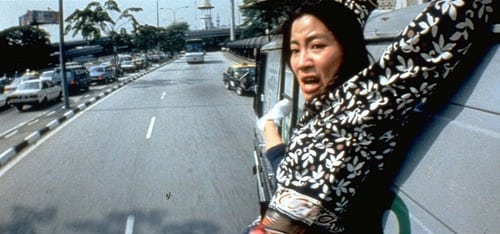
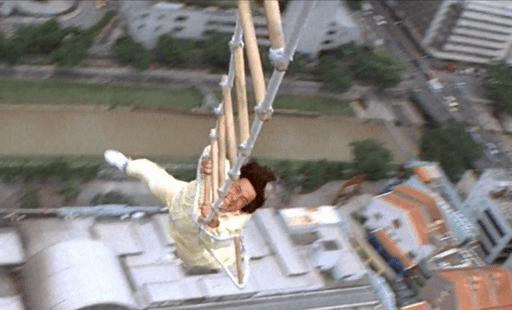




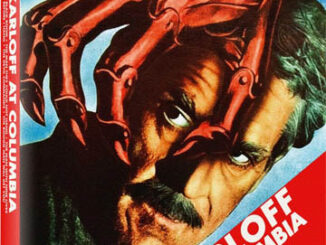
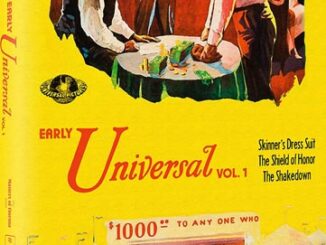
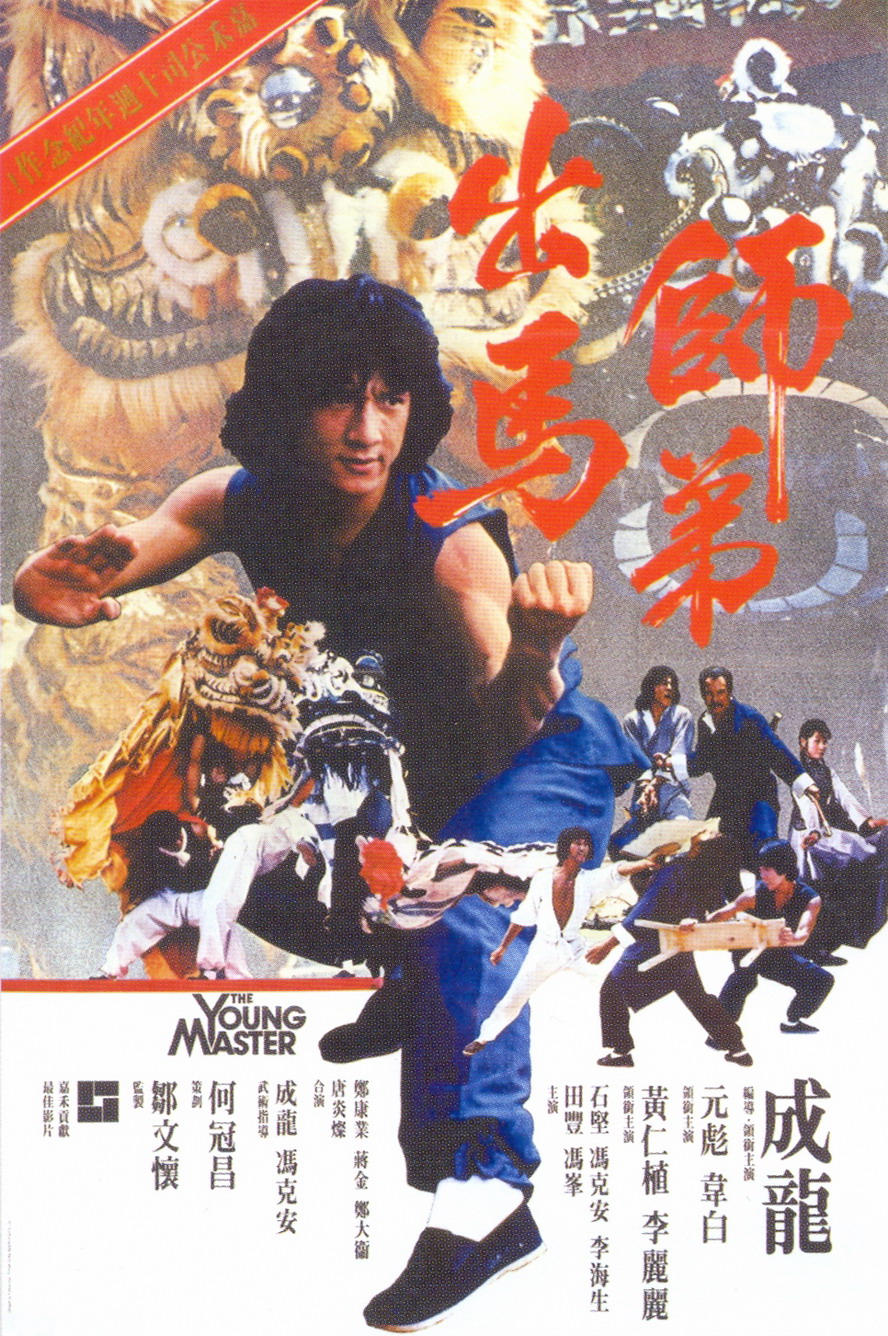
Be the first to comment